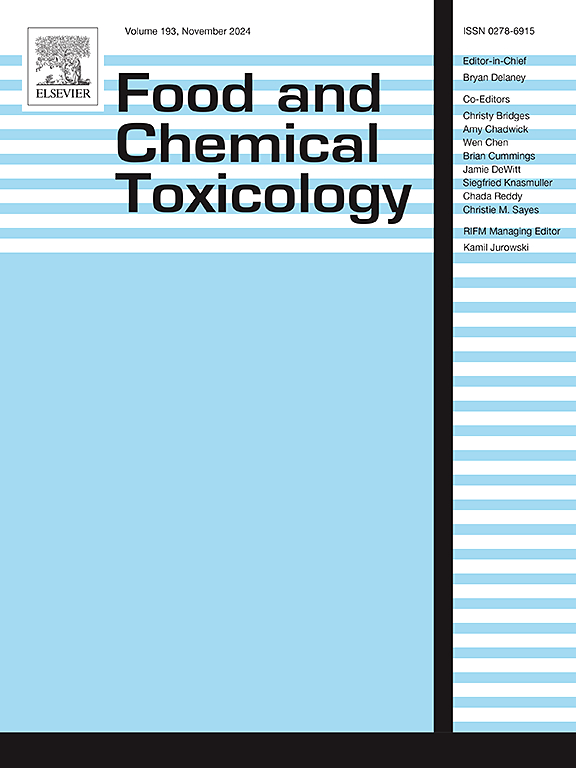山奈酚通过抑制NF-kB信号通路改善复发性自然流产结局,防止氧化应激损伤。
IF 3.9
3区 医学
Q2 FOOD SCIENCE & TECHNOLOGY
引用次数: 0
摘要
山奈酚(KFL)是一种天然类黄酮,存在于各种蔬菜和水果中,以其生物特性而闻名,如抗炎和抗氧化作用。然而,关于KFL对复发性自然流产(RSA)的潜在影响的研究还很缺乏。本研究拟通过雌性CBA/J小鼠与雄性DBA/2小鼠交配建立RSA模型,评估KFL对RSA的影响。结果表明,KFL可降低胚胎吸收,减少母胎界面炎症,平衡辅助性T - 1/T - 2比例,最终改善妊娠结局。此外,KFL还能促进RSA小鼠胎盘组织的发育,减少细胞凋亡,减轻氧化应激。此外,我们还研究了KFL对氧化损伤HTR-8/Svneo细胞的影响。结果表明,KFL通过调节NF-κB通路减轻滋养层细胞的氧化损伤。此外,RNA测序显示,KFL处理导致HTR-8/Svneo细胞的转录组发生较大变化。总的来说,研究表明KFL有可能减轻胎盘炎症和氧化应激,从而提高RSA小鼠的妊娠结局。KFL减轻氧化损伤的调控机制可能与调节NF-κB通路有关。本文章由计算机程序翻译,如有差异,请以英文原文为准。
Kaempferol improves recurrent spontaneous abortion outcomes and prevents oxidative stress damage by inhibiting the NF-kB signaling pathway
Kaempferol (KFL) is a natural flavonoid found in various vegetables and fruits, known for its biological properties such as anti-inflammatory and antioxidant effects. However, there is a lack of research on the potential impact of KFL on recurrent spontaneous abortion (RSA). This study sought to establish an RSA model by mating female CBA/J mice with male DBA/2 mice to assess the influence of KFL on RSA. The results demonstrated that KFL administration leads to a decrease in embryo absorption, reduces inflammation at the maternal-fetal interface, and balances the T helper 1/T helper 2 ratio, ultimately enhancing pregnancy outcomes. Additionally, KFL was found to enhance placental development, decrease apoptosis, and alleviate oxidative stress in placental tissues of RSA mice. Besides, we investigated the impact of KFL on oxidation-damaged HTR-8/Svneo cells. The findings indicated that KFL mitigates oxidative damage in trophoblast cells by modulating the NF-κB pathway. Furthermore, RNA sequencing revealed that KFL treatment leads to large transcriptome changes in HTR-8/Svneo cells. Overall, the research demonstrated that KFL has the potential to alleviate placental inflammation and oxidative stress, thereby enhancing pregnancy outcomes in RSA mice. The regulatory mechanism of KFL in reducing oxidative damage may be involved in modulating the NF-κB pathway.
求助全文
通过发布文献求助,成功后即可免费获取论文全文。
去求助
来源期刊

Food and Chemical Toxicology
工程技术-毒理学
CiteScore
10.90
自引率
4.70%
发文量
651
审稿时长
31 days
期刊介绍:
Food and Chemical Toxicology (FCT), an internationally renowned journal, that publishes original research articles and reviews on toxic effects, in animals and humans, of natural or synthetic chemicals occurring in the human environment with particular emphasis on food, drugs, and chemicals, including agricultural and industrial safety, and consumer product safety. Areas such as safety evaluation of novel foods and ingredients, biotechnologically-derived products, and nanomaterials are included in the scope of the journal. FCT also encourages submission of papers on inter-relationships between nutrition and toxicology and on in vitro techniques, particularly those fostering the 3 Rs.
The principal aim of the journal is to publish high impact, scholarly work and to serve as a multidisciplinary forum for research in toxicology. Papers submitted will be judged on the basis of scientific originality and contribution to the field, quality and subject matter. Studies should address at least one of the following:
-Adverse physiological/biochemical, or pathological changes induced by specific defined substances
-New techniques for assessing potential toxicity, including molecular biology
-Mechanisms underlying toxic phenomena
-Toxicological examinations of specific chemicals or consumer products, both those showing adverse effects and those demonstrating safety, that meet current standards of scientific acceptability.
Authors must clearly and briefly identify what novel toxic effect (s) or toxic mechanism (s) of the chemical are being reported and what their significance is in the abstract. Furthermore, sufficient doses should be included in order to provide information on NOAEL/LOAEL values.
 求助内容:
求助内容: 应助结果提醒方式:
应助结果提醒方式:


